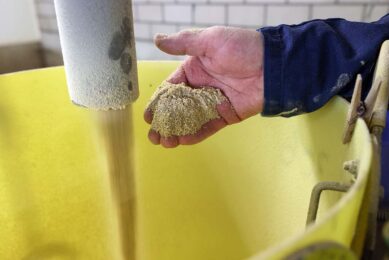Impact of maize detoxification on piglets

How do piglets react to Fusarium toxin-contaminated maize when it is treated with some preservative agents? German researchers did the test and found out that performance parameters were not affected.
Mycotoxins are toxic compounds produced by different types of fungus, belonging mainly to the Aspergillus, Penicillium and Fusarium genera. Under favourable environmental conditions, when temperature and moisture are conducive, these fungi proliferate and may produce mycotoxins. They commonly enter the food chain through contaminated food and feed crops, mainly cereals. In general, pigs are considered the most susceptible animals to mycotoxin contamination. Young animals are even more sensitive to this unwanted toxins in the diet.
A research team from the Institute of Animal Nutrition, Friedrich-Loeffler-Institute FLI and Federal Research Institute for Animal Health in Germany did the following: Deoxynivalenol (DON) and zearalenone (ZEN) contaminated maize was hydrothermally treated in the presence of sodium metabisulphite (SBS), methylamine and calcium hydroxide (Ca(OH)2) and included into diets for female piglets to evaluate effects on performance and toxin residues in serum among others. For this purpose, both uncontaminated maize (CON) and Fusarium toxin-contaminated maize (FUS) were included into diets either untreated (-) or treated (+).
After a feeding period of 27 days it was shown that performance parameters such as feed intake, live weight gain and feed-to-gain ratio remained unaffected by the treatments. The highest toxin and toxin metabolite concentrations in serum were detected in group FUS-, whereas ingestion of diet FUS+ reduced the concentrations to the level of the control groups. Serum biochemical and haematological parameters were mainly within the given reference ranges and showed no treatment-related alterations. Stimulation of peripheral blood mononuclear cells was not affected.
According to the researchers, an effective detoxification of maize by hydrothermal treatment in the presence of SBS, methylamine and Ca(OH)2 could be demonstrated by means of serum toxin analyses. No undesired side effects of the treated-feed stuff or the chemicals themselves on the health of piglets were detected.
This study was originally published in the August 2013 edition of the Journal Archives of Animal Nutrition.
 Beheer
Beheer








 WP Admin
WP Admin  Bewerk bericht
Bewerk bericht